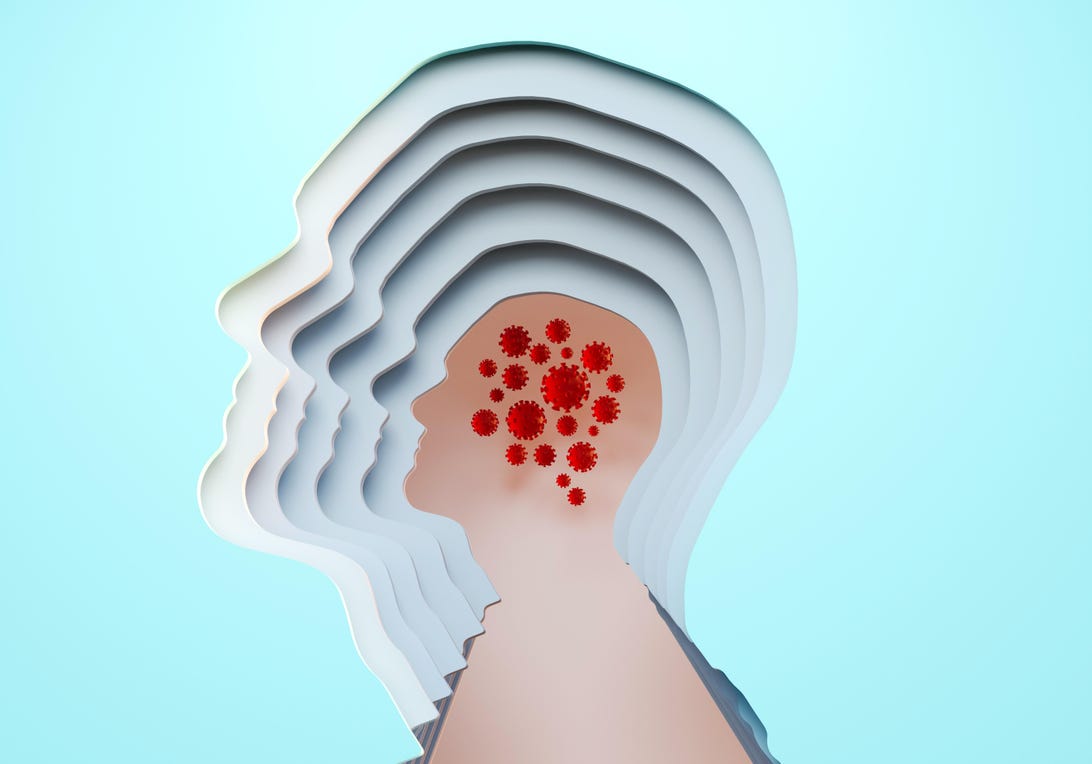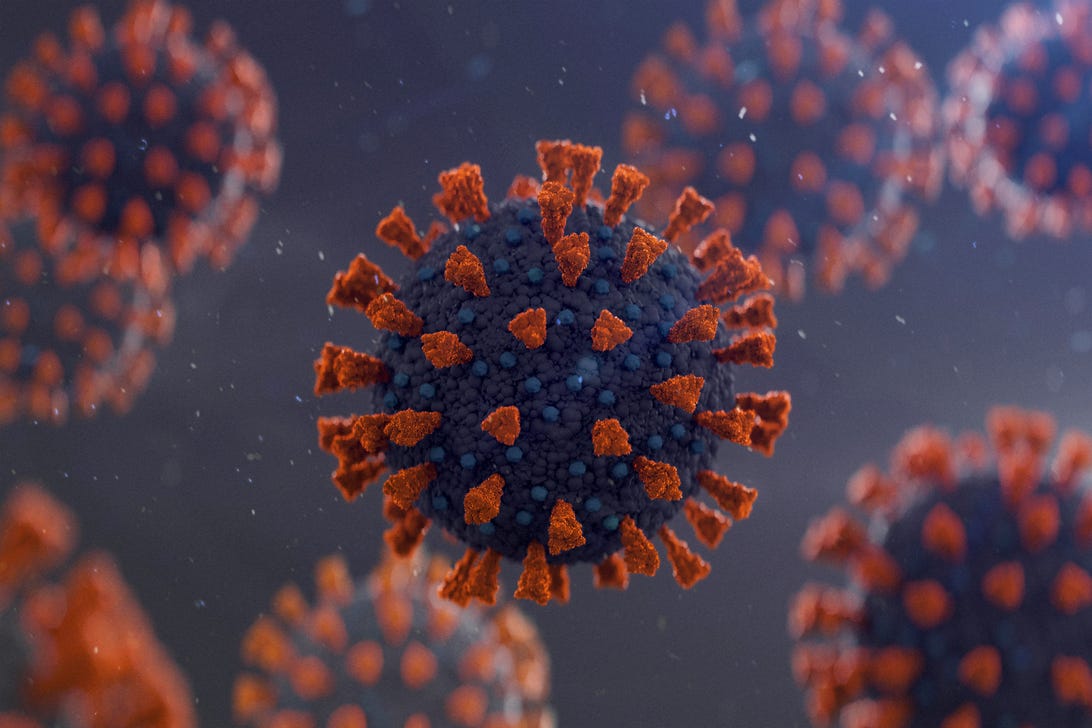
Months after testing positive for COVID-19, some people continue to be plagued by symptoms that just won’t let up.
“Long COVID,” which falls under the umbrella of what the US Centers for Disease Control and Prevention calls post-COVID conditions, consists of new or returning health problems four or more weeks after someone’s infection with COVID-19. The symptoms vary person to person, ranging from mildly bothersome to completely debilitating. As of July 2021, long COVID is considered a disability under the Americans with Disability Act.
Even people with very mild cases of COVID-19 can be afflicted with long COVID or become “COVID long-haulers,” and scientists everywhere are trying to figure out what it is about the virus that causes COVID-19 that makes it a lasting illness for some. For months after catching COVID-19, persistent symptoms have impacted people’s mental health and organ function, caused chronic pain, affected their ability to enjoy food, completely depleted their energy and more.
Here’s what you should know about long COVID, including how common it is, whether vaccines help and more. Plus, find out how scientists are still working to crack the mysteries behind why some people get long COVID and others don’t.


How common is long COVID? Can omicron cause it?
Earlier in January, Dr. Chris Beyrer, an epidemiologist at Johns Hopkins Bloomberg School of Public Health, said roughly 15 to 20% of people who have confirmed cases of COVID-19 develop lingering symptoms. At the end of December, a study was published in the journal Brain, Behavior and Immunity, which found that more than 30% of all people who had COVID-19, and about 80% of people hospitalized with COVID-19, may experience symptoms after their illness.
In June, Dr. Nasia Safdar, the medical director of infection control at the University of Wisconsin, told CNET that the varying numbers of people who are affected by COVID-19 long-term likely depends on the population and who was enrolled in the study.
Now, with the new omicron variant and the large wake of COVID-19 infections it’s leaving behind, we’ll require more research into how many people will go on to develop long COVID after recovering from omicron. As The New York Times reported, omicron’s decreased severity compared to delta doesn’t necessarily mean a decreased risk for long COVID, as many people who suffer from the condition from earlier variants had mild or even asymptomatic cases.
What are the symptoms of long COVID?
Some lingering symptoms of COVID-19, per the CDC, include:
- Difficulty breathing or shortness of breath
- Tiredness or fatigue
- Symptoms that get worse after physical or mental activities
- Difficulty thinking or concentrating (“brain fog”)
- Cough
- Chest or stomach pain
- Headache
- Fast-beating or pounding heart (also known as heart palpitations)
- Joint or muscle pain
- Pins-and-needles feeling
- Diarrhea
- Sleep problems
- Fever
- Dizziness on standing (lightheadedness)
- Rash
- Mood changes
- Change in smell or taste
- Changes in menstrual period cycle
Safdar said that the key to discerning long COVID is to pay attention to new symptoms that develop or ones that never go away, after about 30 days post-infection.
“The most common ones that we’re seeing are those that are dealing with what’s called higher executive functions,” Safdar said. “Concentration, memory, being able to do your job the way you could before.”
“Those kinds of symptoms are hard for people to describe,” she said, “but they’ve clearly noticed a change from the way they were before.”
At the end of 2021, fatigue and that persistent feeling of brain fog were still among the most common symptoms of COVID-19. The study in Brain, Behavior and Immunity found that as many as one in three people were fatigued 12 weeks or more after COVID-19 diagnosis, and one in five had cognitive impairment.
One symptom of COVID-19 that affected many people who were sick from earlier variants of the coronavirus, and for some lingers as their new normal, is the loss of taste and smell, called anosmia. (The symptom hasn’t appeared quite as commonly during the delta and omicron waves.) For many, this persistent loss doesn’t only affect how they enjoy their food or a favorite smell, but it can meddle with their memories and the way they experience things.
Other viruses have caused loss of smell prior to the coronavirus pandemic, but the sheer number of people affected by it because of COVID-19 is a bit of a phenomenon. According to the Mayo Clinic, the reasons for loss of smell and taste aren’t entirely understood, but it’s likely due to damage to the cells that support olfactory neurons.


The list of long COVID symptoms goes on: One study published in the Journal of American Nephrology in September found that kidney damage or disease might be a long-term effect of COVID-19. Damage to other organs including the brain, heart and lungs, as well as blood clots or blood vessel problems and multisystem inflammatory syndrome are also more severe symptoms of long COVID, according to the Mayo Clinic.
A report published this month by the CDC found that kids under 18 who had COVID-19 more than 30 days prior were more likely to be diagnosed with diabetes compared to kids who didn’t have COVID-19. The report is “consistent with previous research demonstrating an association between SARS-CoV-2 infection and diabetes in adults,” the CDC said.
What causes long COVID? Do the vaccines help?
Because of the huge number of people living with post-COVID symptoms, we can expect research to continue for years to come. Certain people may also be at higher risk. In a September report from the CDC, the agency found that people age 40 and up, people living with a preexisting medical condition, Black people and women were more likely to experience long-term symptoms of COVID-19.
Type 2 diabetes, in particular, might be a risk factor for long COVID, according to research published this week in the journal Cell. The same research also found that a past infection with Epstein-Barr virus (which can cause mono) might increase someone’s risk if the virus is reactivated, as well as SARS-CoV-2 RNAemia, or virus in the blood. Other research has also pointed to lower levels of some antibodies in the blood of people who develop long COVID.
Another theory on what causes the syndrome involves microclots in the blood of people living with long COVID. In an op-ed for The Guardian, South African scientist Resia Pretorius said that a study found inflammatory molecules trapped in microclots, which restricts cells from getting enough oxygen to perform bodily functions. This, Pretorius said, “may be central to the numerous reported debilitating symptoms.”
It’s also possible, or even likely, that long COVID isn’t caused by just one thing. The inflammation COVID-19 causes in the body can have a myriad of effects, as can each individual damaged organ from the illness. As NPR reported, there has also been some evidence to suggest the virus can hide in the body, as seen in the immune system’s T-cell activity.
COVID-19 vaccines may reduce the risk of long COVID by lowering your chance of getting infected, but the jury’s out on how much they protect you if you get a breakthrough COVID-19 infection, according to a November article in the Nature journal. While the COVID-19 vaccines dramatically lower someone’s risk of getting severely sick and needing to be hospitalized, long COVID can happen in people with extremely mild cases of the disease.
But there is one September study that found that the risk for COVID-19 symptoms lasting for a month or more is lowered in people who’ve had two shots by roughly half. Other preliminary research, as reported by the San Francisco Chronicle, suggests that having even one dose of a COVID-19 vaccine may reduce risk of long COVID: People who got their first shot within 12 weeks of getting COVID-19 had a reduced risk of long COVID symptoms. The study hasn’t yet been peer-reviewed, but confirming those findings could inspire the CDC to change its guidance on when people should get vaccinated after having COVID-19, as the Chronicle reported and immunologist Akiko Iwasaki shared on Twitter. Currently, the agency says to wait to get vaccinated until you’ve recovered.
Researchers have also hypothesized that the reason some people with long COVID report feeling much better after getting the vaccine is due to a “reset” of the immune system, or because it serves as an aid to fight off the lingering virus, though that’s not the case for everyone. While one survey found that 40% of people with long COVID reported their symptoms improved after vaccination, another 14% said their symptoms got worse. (Some researchers also believe that, in very rare events, COVID-19 vaccines themselves can trigger symptoms of long COVID. But this research is inconclusive and hard to link to the vaccine. If there is a link, a researcher describes the event as “extremely rare” compared to the 5-40% of people who develop long COVID after getting sick.)
More than 361 million cases of COVID-19 have been reported in the world, which many researchers believe is an undercount. Of people who’ve been sick, a significant portion of them have yet to feel like their old selves. More research is needed to understand why long COVID manifests, and organizations including the National Institutes for Health have launched research efforts to try to understand more about the syndrome.
The information contained in this article is for educational and informational purposes only and is not intended as health or medical advice. Always consult a physician or other qualified health provider regarding any questions you may have about a medical condition or health objectives.




